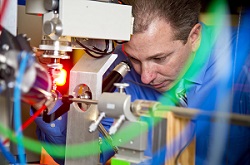 |
| Purdue's Andrew Mesecar is working on a MERS vaccine.--Courtesy of Purdue University |
In an important step toward the creation of a vaccine against deadly coronaviruses, researchers from Purdue University have figured out how to disable a key enzyme of the SARS virus that helps it trick the immune system.
The investigators have captured the molecular structure of this SARS enzyme--called a papain-like protease, or PLpro--showing how it strips a host cell of two proteins, ubiquitin and ISG15, that are involved in triggering an immune response. PLpro also plays a major role in viral replication because of its ability to clip viral polyproteins into individual proteins. Snipping these proteins effectively prevents the host cell from alerting the immune system to the presence of the virus, allowing it to further infect cells.
The findings, which were published in PLOS Pathogens, could help scientists develop a vaccine against severe acute respiratory syndrome (SARS), and its harder-to-transmit but more lethal relative, Middle East respiratory syndrome coronavirus (MERS). Currently, there is no treatment for MERS or SARS, the latter of which caused 774 deaths and 8,098 illnesses in 2003.
"This is a first step toward creating a weakened and safe virus for use in an attenuated live vaccine," said Andrew Mesecar, Purdue's Walther Professor of Cancer Structural Biology and professor of biological sciences and chemistry. "This also could serve as a molecular roadmap for performing similar studies on other coronaviruses, like MERS, because this enzyme appears to be common to all viruses within this family."
MERS is believe to have first emerged in Saudi Arabia in 2012, but since April, the virus has been on a disturbing upswing, infecting 683 people and causing 204 deaths, according to the World Health Organization's latest numbers. In May, the Centers for Disease Control and Prevention confirmed the first two cases of MERS in the U.S. With an estimated fatality rate of 30%, a vaccine against the virus could be an essential tool in stopping its spread.
Mesecar and his team are now applying their findings to the MERS virus. They have found that the PLpro enzyme in the MERS virus also removes ISG15 and ubiquitin from host cell proteins.
- read the news from Purdue
- get the study from PLOS Pathogens